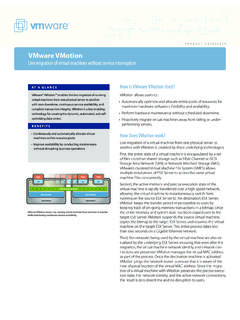Transcription of Optimizing Parallel Reduction in CUDA
1 Optimizing Parallel Reduction in cuda . Mark Harris NVIDIA Developer Technology Parallel Reduction Common and important data Parallel primitive Easy to implement in cuda . Harder to get it right Serves as a great optimization example We'll walk step by step through 7 different versions Demonstrates several important optimization strategies 2. Parallel Reduction Tree-based approach used within each thread block 3 1 7 0 4 1 6 3. 4 7 5 9. 11 14. 25. Need to be able to use multiple thread blocks To process very large arrays To keep all multiprocessors on the GPU busy Each thread block reduces a portion of the array But how do we communicate partial results between thread blocks?
2 3. Problem: Global Synchronization If we could synchronize across all thread blocks, could easily reduce very large arrays, right? Global sync after each block produces its result Once all blocks reach sync, continue recursively But cuda has no global synchronization. Why? Expensive to build in hardware for GPUs with high processor count Would force programmer to run fewer blocks (no more than #. multiprocessors * # resident blocks / multiprocessor) to avoid deadlock, which may reduce overall efficiency Solution: decompose into multiple kernels Kernel launch serves as a global synchronization point Kernel launch has negligible HW overhead, low SW overhead 4.
3 Solution: Kernel Decomposition Avoid global sync by decomposing computation into multiple kernel invocations 3 1 7 0 4 1 6 3 3 1 7 0 4 1 6 3 3 1 7 0 4 1 6 3 3 1 7 0 4 1 6 3 3 1 7 0 4 1 6 3 3 1 7 0 4 1 6 3 3 1 7 0 4 1 6 3 3 1 7 0 4 1 6 3. 4 7 5 9 4 7 5 9 4 7 5 9 4 7 5 9 4 7 5 9 4 7 5 9 4 7 5 9 4 7 5 9. 11 14 11 14 11 14 11 14 11 14 11 14 11 14 11 14. 25 25 25 25 25 25 25 25 Level 0: 8 blocks 3 1 7 0 4 1 6 3. 4 7 5 9. Level 1: 11. 25. 14. 1 block In the case of reductions, code for all levels is the same Recursive kernel invocation 5. What is Our Optimization Goal? We should strive to reach GPU peak performance Choose the right metric: GFLOP/s: for compute-bound kernels Bandwidth: for memory-bound kernels Reductions have very low arithmetic intensity 1 flop per element loaded (bandwidth-optimal).
4 Therefore we should strive for peak bandwidth Will use G80 GPU for this example 384-bit memory interface, 900 MHz DDR. 384 * 1800 / 8 = GB/s 6. Reduction #1: Interleaved Addressing __global__ void reduce0(int *g_idata, int *g_odata) {. extern __shared__ int sdata[];. // each thread loads one element from global to shared mem unsigned int tid = ;. unsigned int i = * + ;. sdata[tid] = g_idata[i];. __syncthreads();. // do Reduction in shared mem for(unsigned int s=1; s < ; s *= 2) {. if (tid % (2*s) == 0) {. sdata[tid] += sdata[tid + s];. }. __syncthreads();. }. // write result for this block to global mem if (tid == 0) g_odata[ ] = sdata[0].}
5 }. 7. Parallel Reduction : Interleaved Addressing Values ( shared memory) 10 1 8 -1 0 -2 3 5 -2 -3 2 7 0 11 0 2. Step 1 Thread Stride 1 IDs 0 2 4 6 8 10 12 14. Values 11 1 7 -1 -2 -2 8 5 -5 -3 9 7 11 11 2 2. Step 2 Thread Stride 2 IDs 0 4 8 12. Values 18 1 7 -1 6 -2 8 5 4 -3 9 7 13 11 2 2. Step 3 Thread Stride 4 IDs 0 8. Values 24 1 7 -1 6 -2 8 5 17 -3 9 7 13 11 2 2. Step 4 Thread 0. Stride 8 IDs Values 41 1 7 -1 6 -2 8 5 17 -3 9 7 13 11 2 2. 8. Reduction #1: Interleaved Addressing __global__ void reduce1(int *g_idata, int *g_odata) {. extern __shared__ int sdata[];. // each thread loads one element from global to shared mem unsigned int tid =.
6 Unsigned int i = * + ;. sdata[tid] = g_idata[i];. __syncthreads();. // do Reduction in shared mem for (unsigned int s=1; s < ; s *= 2) {. if (tid % (2*s) == 0) {. Problem: highly divergent sdata[tid] += sdata[tid + s];. } warps are very inefficient, and __syncthreads(); % operator is very slow }. // write result for this block to global mem if (tid == 0) g_odata[ ] = sdata[0];. }. 9. Performance for 4M element Reduction Time (222 ints) Bandwidth Kernel 1: ms GB/s interleaved addressing with divergent branching Note: Block Size = 128 threads for all tests 10. Reduction #2: Interleaved Addressing Just replace divergent branch in inner loop: for (unsigned int s=1; s < ; s *= 2) {.
7 If (tid % (2*s) == 0) {. sdata[tid] += sdata[tid + s];. }. __syncthreads();. }. With strided index and non-divergent branch: for (unsigned int s=1; s < ; s *= 2) {. int index = 2 * s * tid;. if (index < ) {. sdata[index] += sdata[index + s];. }. __syncthreads();. }. 11. Parallel Reduction : Interleaved Addressing Values ( shared memory) 10 1 8 -1 0 -2 3 5 -2 -3 2 7 0 11 0 2. Step 1 Thread Stride 1 IDs 0 1 2 3 4 5 6 7. Values 11 1 7 -1 -2 -2 8 5 -5 -3 9 7 11 11 2 2. Step 2 Thread Stride 2 IDs 0 1 2 3. Values 18 1 7 -1 6 -2 8 5 4 -3 9 7 13 11 2 2. Step 3 Thread Stride 4 IDs 0 1. Values 24 1 7 -1 6 -2 8 5 17 -3 9 7 13 11 2 2. Step 4 Thread 0.
8 Stride 8 IDs Values 41 1 7 -1 6 -2 8 5 17 -3 9 7 13 11 2 2. New Problem: shared Memory Bank Conflicts 12. Performance for 4M element Reduction Step Cumulative Time (222 ints) Bandwidth Speedup Speedup Kernel 1: interleaved addressing ms GB/s with divergent branching Kernel 2: interleaved addressing ms GB/s with bank conflicts 13. Parallel Reduction : Sequential Addressing Values ( shared memory) 10 1 8 -1 0 -2 3 5 -2 -3 2 7 0 11 0 2. Step 1 Thread Stride 8 IDs 0 1 2 3 4 5 6 7. Values 8 -2 10 6 0 9 3 7 -2 -3 2 7 0 11 0 2. Step 2 Thread Stride 4 IDs 0 1 2 3. Values 8 7 13 13 0 9 3 7 -2 -3 2 7 0 11 0 2. Step 3 Thread Stride 2 IDs 0 1.
9 Values 21 20 13 13 0 9 3 7 -2 -3 2 7 0 11 0 2. Step 4 Thread IDs 0. Stride 1. Values 41 20 13 13 0 9 3 7 -2 -3 2 7 0 11 0 2. Sequential addressing is conflict free 14. Reduction #3: Sequential Addressing Just replace strided indexing in inner loop: for (unsigned int s=1; s < ; s *= 2) {. int index = 2 * s * tid;. if (index < ) {. sdata[index] += sdata[index + s];. }. __syncthreads();. }. With reversed loop and threadID-based indexing: for (unsigned int s= ; s>0; s>>=1) {. if (tid < s) {. sdata[tid] += sdata[tid + s];. }. __syncthreads();. }. 15. Performance for 4M element Reduction Step Cumulative Time (222 ints) Bandwidth Speedup Speedup Kernel 1: interleaved addressing ms GB/s with divergent branching Kernel 2: interleaved addressing ms GB/s with bank conflicts Kernel 3: ms GB/s sequential addressing 16.
10 Idle Threads Problem: for (unsigned int s= ; s>0; s>>=1) {. if (tid < s) {. sdata[tid] += sdata[tid + s];. }. __syncthreads();. }. Half of the threads are idle on first loop iteration! This is wasteful . 17. Reduction #4: First Add During Load Halve the number of blocks, and replace single load: // each thread loads one element from global to shared mem unsigned int tid = ;. unsigned int i = * + ;. sdata[tid] = g_idata[i];. __syncthreads();. With two loads and first add of the Reduction : // perform first level of Reduction , // reading from global memory, writing to shared memory unsigned int tid = ;. unsigned int i = *( *2) +.


















